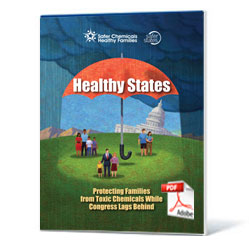This piece was originally published in the Huffington Post, November 17, 2010.
 By Andy Igrejas
By Andy Igrejas
Director, Safer Chemicals, Healthy Families coalition
I’ll be the first to admit it: I live in Washington, D.C., and I spend a lot of time talking to inside-the-beltway types about what Congress will and will not do. It’s easy to forget that, sometimes, big change happens without Congress — and despite the efforts of well-funded corporate lobbyists. Case in point is the latest report from the Safer Chemicals, Healthy Families coalition, Healthy States: Protecting Families From Toxic Chemicals While Congress Lags Behind. What this report makes clear is, Americans of all political persuasions have decided that toxic chemicals pose a health risk that cannot be ignored, and they have taken matters into their own hands.
While Congress-watchers wonder whether or not Republican leaders and chemical industry lobbyists are ready to overhaul our nation’s woefully out-of-date chemicals policy, the states have been getting things done.
While Congress-watchers wonder whether or not Republican leaders and chemical industry lobbyists are ready to overhaul our nation’s woefully out-of-date chemicals policy, the states have been getting things done. In the last eight years, eighteen states have passed 71 chemical safety laws. Sixty-six laws banned bisphenol A (BPA) in baby and toddler products (with 98% support), phased out toxic flame retardants (PBDEs) in home products (93%), reduced children’s exposure from common products containing lead (88%) and cadmium (86%), and promoted green cleaning (88%).
Next to the sheer numbers, what’s most notable in these findings is that the laws passed by an overwhelming bipartisan margin. Of the votes cast, about 99% of Democrats and 73% of Republicans favored stronger protections for children’s health and the environment from dangerous chemicals, with equal support from governors of each party.
Three factors are driving state legislators to take action on toxic chemicals: 1) mounting scientific evidence that exposure to certain chemicals is harming our nation’s health 2) loud public outcry against what are viewed as chemical intruders in the family home 3) deep frustration that Congress refuses to hold industry accountable for proving chemicals in products are safe before they arrive on store shelves.
It’s hard to overestimate just how frustrated Americans have become. Once people realize that the chemicals used to make their children’s pajamas are less regulated than what comes out of an industrial smokestack, they are ready for change. A recent poll conducted by The Mellman Group found that 78% of Americans are seriously concerned about the threat to children’s health from toxic chemicals in day-to-day life, and 84% say that “tightening controls” on chemical regulation is important.
So why don’t factors #1 and #2 spur Congress to take action? There’s no easy answer. A large factor this year was that chemical industry lobbyists lulled Congress into complacency by saying they were ready for reform, but once the House and the Senate actually produced proposals, the industry lobbyists spent millions to bury them.
The good news is that, along with the states, leading retailers like Walmart and Staples and service providers like Kaiser Permanente are not waiting for Congress. They’ve seen the writing on the wall and are adjusting their formulas and supply chains accordingly. Manufacturers are adjusting, too. For example, thanks to consumer pressure, you can’t even find a plastic baby bottle with bisphenol A (BPA) in it anymore. Consumers shunned BPA, retailers pulled it from the shelves, plastic bottle manufacturers purged it from the mix, and the sky did not fall.
It shows that stronger chemical regulation is a snowball that even the biggest chemical industry lobbying effort can’t stop.
The Healthy States report gives me great hope. It shows that, once you step outside the beltway, there is strong bipartisan support for reform. It shows that stronger chemical regulation is a snowball that even the biggest chemical industry lobbying effort can’t stop. Mounting scientific evidence combined with heightened media attention, growing consumer awareness, increased business response, and accelerating state action means that most unhealthy chemicals will eventually be routed from the marketplace. Big change is underway without much participation from Congress, but is that how it should be? I don’t think so. Congress can do what no single state can do: it can protect the public health by making sure everyone is protected from toxic chemicals, not just those lucky enough to live in states with good laws.
I feel fairly certain that eventually, the chemical industry will accept reform as an inevitable evolution of the marketplace. I’m also optimistic that both Democrats and Republicans in Congress will, eventually, recognize chemical reform as bipartisan winner. The real question is, wouldn’t it be better for everyone if Congress acted sooner rather than later?



